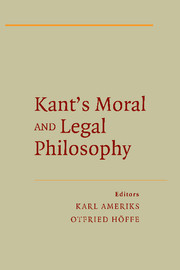Book contents
- Frontmatter
- Contents
- ACKNOWLEDGMENTS
- CONTRIBUTORS
- WORKS BY KANT
- Introduction
- I EARLY CONCEPTIONS
- II GROUNDWORK OF THE METAPHYSICS OF MORALS
- III CRITIQUE OF PRACTICAL REASON
- IV LEGAL AND POLITICAL PHILOSOPHY
- 11 On How to Acquire Something External, and Especially on the Right to Things (A Commentary on the Metaphysics of Morals §§10–17)
- 12 ‘The Civil Constitution in Every State Shall Be a Republican One’
- 13 Commentary on Kant's Treatment of Constitutional Right (Metaphysics of Morals II: General Remark A; §§51–52, Conclusion, Appendix)
- 14 Refusing Sovereign Power – The Relation between Philosophy and Politics in the Modern Age
- BIBLIOGRAPHY
- INDEX
11 - On How to Acquire Something External, and Especially on the Right to Things (A Commentary on the Metaphysics of Morals §§10–17)
Published online by Cambridge University Press: 13 November 2009
- Frontmatter
- Contents
- ACKNOWLEDGMENTS
- CONTRIBUTORS
- WORKS BY KANT
- Introduction
- I EARLY CONCEPTIONS
- II GROUNDWORK OF THE METAPHYSICS OF MORALS
- III CRITIQUE OF PRACTICAL REASON
- IV LEGAL AND POLITICAL PHILOSOPHY
- 11 On How to Acquire Something External, and Especially on the Right to Things (A Commentary on the Metaphysics of Morals §§10–17)
- 12 ‘The Civil Constitution in Every State Shall Be a Republican One’
- 13 Commentary on Kant's Treatment of Constitutional Right (Metaphysics of Morals II: General Remark A; §§51–52, Conclusion, Appendix)
- 14 Refusing Sovereign Power – The Relation between Philosophy and Politics in the Modern Age
- BIBLIOGRAPHY
- INDEX
Summary
The first part of the Doctrine of Right presents Kant's analysis of ‘Private Right’ in three chapters (§§1–40). The discussion of the ‘General principle of external acquisition’ in §10 introduces the second chapter on ‘How to acquire something external’ (6:258, my emphasis). The discussion in §10 supplements the previous discussion of ‘How to have something external as one's own’ (6:245–257, §§1–9, my emphasis), which had merely grounded the necessity of rightful possession in terms of the rightful postulate of practical reason, which asserts the possibility of distinguishing between ‘what is externally mine or yours.’ In §10, Kant is concerned with the actual realisation of this possibility.
The analysis in §10 treats of acquisition in general, and draws conclusions that also hold for the next three sections of the text: that on ‘property right,’ or one's right to things [Sachenrecht] (§§11–17), that on ‘contract right,’ or one's rights to persons [Personenrecht] (§§18–21), and that on ‘rights to persons akin to rights to things’ [das auf dingliche Art persönliche Recht] (§§22–30). This becomes quite clear at the end of §10, where Kant outlines his ‘Division of the acquisition [Erwerbung] of something external that is mine or yours’ (6:259, my emphasis).
The specific title of §10 makes no particular reference to original acquisition, nor to the acquisition of external things, but speaks solely of the general principle of external acquisition.
Keywords
- Type
- Chapter
- Information
- Kant's Moral and Legal Philosophy , pp. 231 - 245Publisher: Cambridge University PressPrint publication year: 2009
- 2
- Cited by



